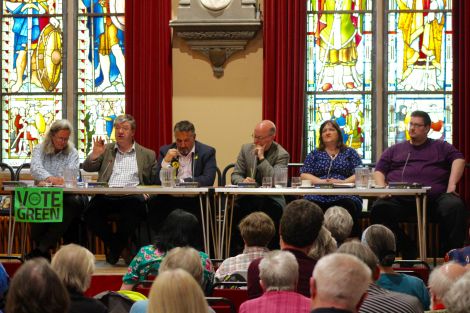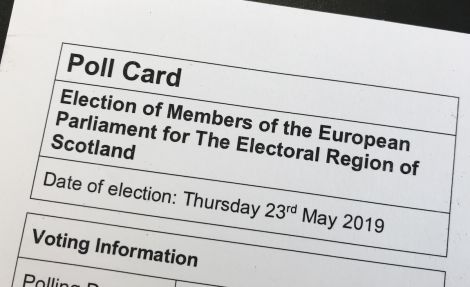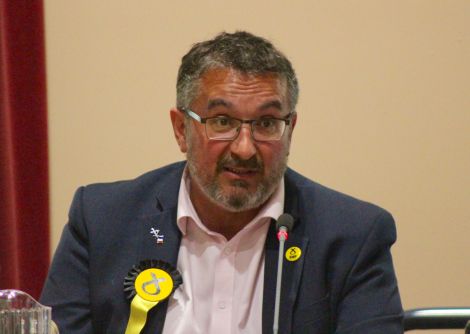Politics / Brexit dominates European election Althing debate
IT IS something the UK Government didn’t want, and historically it’s never had a great turnout. But with a unique political landscape, what does Shetland think about next week’s European Parliament elections?
On Thursday the public will go to the polls to elect MEPs to the European Parliament, the legislative body of the European Union (EU), even though the UK is on course to leave the EU.
It could be argued that there’s little at stake other than it being a chance to make a ceremonial stand one way or the other, but there was certainly some political fizz bubbling away at the Lerwick Town Hall on Saturday afternoon at least.
The Althing debating society invited speakers representing all parties in the election for its hustings, but it was perhaps telling there was no representation from the Conservatives, who initially brought the 2016 EU referendum to the table, nor the newly formed Brexit Party, which hails Nigel Farage as its poster boy and is performing strongly in the national polls.
From the audience viewpoint on the left of the stage under the ornate stained glass windows was Denyse Harper from the Greens, while on the right was UKIP member Nathan Leask. Seat layout a coincidence, perhaps – who knows.
Sandwiched in the middle was Northern Isles MP Alistair Carmichael from the Liberal Democrats, the SNP’s Christian Allard, who is a candidate in the election and a current Aberdeen councillor, and Johan Adamson of Labour, with teacher Irvine Tait presiding as the independent chairperson.
Rather than a show of hands, the Althing organisers gave attendees a chance to state their voting preference as they stepped into the hall, and also as they left, on a chart in the lobby to see how the debate changed minds.
The 44 entry votes saw six go to the Greens, two to Labour, seven to the Liberal Democrats, 23 to the SNP and one to UKIP, while the Brexit party had 3.5, and the Tories had 0.5. Change UK, the independent party formed to represent the middle ground, had no fans, while one solitary attendee did not know who to vote for.
Become a supporter of Shetland News
With the debate coming onto two hours long, there was plenty to ruminate on, but Brexit – something which Shetland voted against – was naturally the topic of choice.
As such, it threatened to be a re-run of the recent SNP-organised cross-party town hall debate on a second EU referendum, but the addition of the Greens and UKIP brought a different flavour to the rhetoric.
It was up to Frenchman Allard to open, who suggested a vote for the SNP in the European elections was about “people”, not jobs or the EU.
“It’s about you, it’s about all of us,” he said.
Brexit supporter Leask claimed the EU is a “protectionist racket”, saying leaving the union could give the UK opportunities – although he reiterated that UKIP is “not anti-European”.
“Are we brave enough to force our future into our own hands?” he asked.
Politics veteran Carmichael, who could probably do these town hall debates in his sleep, said the public deserved a second vote on leaving the EU.
He expressed worry over the “threat to liberal values across Europe” in addition to a moves to limit freedom of movement.
Accountant Adamson quipped that as a lover of maths, she was “hating the division” in politics right now.
She said “negotiating a new [Brexit] deal with a customs union is a good compromise” – and she said Labour would stick up for fishermen.
Harper, meanwhile, said by staying in the EU “we can reform what needs to be reformed.”
“We would like to see a second referendum, and failing that we would like to see Article 50 revoked,” the Green representative said, adding that climate change, human rights and freedom of movement were key priorities for her party.
The questions from the floor too were centred on leaving the EU, with concerns over the impact on the Erasmus education exchange programme opening the audience contributions.
“I don’t see the need to shut borders down when it comes to education,” UKIP’s Leask said.
He then said the EU was un-democratic and likened it to fascism – a comment which riled up audience member Jonathan Wills.
He said it was “damn nonsense” that the EU was undemocratic – “you people should check your facts before you start blaring your lies” – and said he took great exception to the fascism comment, with the audience voicing their agreement with Wills.
Leask responded by pointing to how the roles like the president of the European Commission is nominated, not directly elected by the public.
Carmichael sought to simmer things down a little, saying people need to be careful about their choice of language.
“We are divided as a nation and we see a flavour of that in the room today,” he said.
“Let’s try to keep a measured and rational tone.”
One audience member stressed the importance of freedom of movement of people for Shetland’s industries, such as tourism, agriculture and fishing.
Leask, however, was on his own when said he believed freedom of movement has put “a lot of strain” on the UK’s health and education systems.
Climate change policy was also put to the speakers, with Harper saying “it is a problem that needs to be solved”.
Adamson, however, admitted it was “frightening” to consider giving up Shetland’s oil jobs in a drive to cut down on carbon-emitting industries.
Allard, meanwhile, said the young generation was “putting us to shame” when it came to climate change and the environment.
“We need finance in place now, and solutions in place now,” he stressed.
Another audience member raised concern over the role international trade has on the environment, using the example of shipping cars across the world.
There was broad support from the panel, meanwhile, on retaining a system like the European Health Insurance Card post-Brexit, although Carmichael said it was “one tiny part of the whole massive picture that we will have to renegotiate”.
Other topics raised by the audience included privatised healthcare and the independence issue in Catalonia.
There were some grumbles, too, when an audience member whipped out a print-out of a Nazi Party manifesto and asked Leask to explain the difference between it and the UKIP manifesto.
He strode over the the panel to give Leask a copy, but the UKIP member resolutely ripped it up.
It was a case of moving quickly on for the chair and a question swiftly came in asking whether it was a “dilemma” for the SNP that the UK leaving the EU could strengthen Scotland’s bid to become independent.
But Allard said a vote for the SNP in the European election was “not about independence”.
Carmichael added: “I don’t think there’s a logical consistency in the SNP’s position.”
Stressing the cross-party nature of Brexit, he said it is a “challenge that’s shared by everybody in every part of the United Kingdom”.
Audience member Brian Nugent commented that it was the MPs’ fault that Brexit has stalled despite the country voting for it in the referendum nearly three years ago.
Allard, though, expressed sympathy for politicians who campaigned to remain in the EU but had been forced into sorting out the mechanics of Brexit.
More SNP talk and party member Robbie McGregor asked how Allard, who worked in the North East fishing industry, could justify staying in the EU if it meant staying in the disliked Common Fisheries Policy (CFP) – perhaps feeding his colleague a line to appease local fishermen.
The candidate said he wants the CFP “scrapped, or fundamentally reformed”, a view supported elsewhere on the panel.
To the summing up, and Harper said that “isolationism will not solve the problems that we are facing”.
Adamson encouraged people vote in Thursday’s election to “send a strong message to UKIP and the Tories”, with Leask responding by saying that “nobody can say Brexit is going to be a failure”.
Allard said “if selected I will try my best to replace Nigel Farage [who sits on the EU’s fisheries committee] in the fishing community”.
Carmichael, meanwhile, expressed concern at the “massive spike” in the number of hate crimes committed in the UK after the EU vote, saying the country needs a chance to “take back control”.
But what about the most important exit vote of them all? No, not the referendum in 2016 – the poll of people leaving the Althing debate.
The biggest increase in numbers was for the Greens, with the SNP losing a couple of voters. The total number of people responding to the poll, however, rose from 44 to 50, meaning that the swing numbers may not be the most accurate.
The Greens rose from six to 10, while Labour gained three votes to finish up at five.
Support for the SNP dropped from 23 to 21, and UKIP stayed put at one.
The Conservative tick-box dropped to zero, while the number of people thinking of voting for the Brexit Party slipped from 3.5 to two.
There was still one person unsure about who to vote for, but, perhaps more tellingly, one attendee decided after sitting through the debate that they now would not vote in Thursday’s election.
Become a supporter of Shetland News
Shetland News is asking its many readers to consider start paying for their dose of the latest local news delivered straight to their PC, tablet or mobile phone.
Journalism comes at a price and because that price is not being paid in today’s rapidly changing media world, most publishers - national and local - struggle financially despite very healthy audience figures.
Most online publishers have started charging for access to their websites, others have chosen a different route. Shetland News currently has over 600 supporters who are all making small voluntary financial contributions. All funds go towards covering our cost and improving the service further.
Your contribution will ensure Shetland News can: -
- Bring you the headlines as they happen;
- Stay editorially independent;
- Give a voice to the community;
- Grow site traffic further;
- Research and publish more in-depth news, including more Shetland Lives features.
If you appreciate what we do and feel strongly about impartial local journalism, then please become a supporter of Shetland News by either making a single payment or monthly subscription.
Support us from as little as £3 per month – it only takes a minute to sign up. Thank you.





















